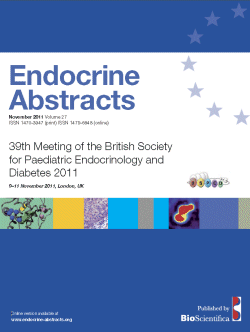
39th Meeting of the British Society for Paediatric Endocrinology and Diabetes
Oral Communications
Oral Communications 3
ea0027oc3.1 | Oral Communications 3 | BSPED2011
The impact of GH deficiency (GHD) and GH treatment (GHTx) on cardiovascular risk in survivors of bone marrow transplantation with total body irradiation (BMT/TBI) in childhood
Davis Nikki , Stevens Michael , Cornish Jacqueline , Stewart Claire , Moss Andrew , Woltersdorf Wolf , Elson Ruth , Crowne Elizabeth
ea0027oc3.2 | Oral Communications 3 | BSPED2011
Clinical, genetic, histological and radiological heterogeneity of focal forms of congenital hyperinsulinism
Ismail Dunia , Kapoor Ritika , Smith Virpi , Ashworth Michael , Blankenstein Oliver , Pierro Agostino , Flanagan Sarah , Ellard Sian , Hussain Khalid
ea0027oc3.3 | Oral Communications 3 | BSPED2011
Laparoscopic near total pancreatectomy for medically unresponsive diffuse congenital hyperinsulinism
Pierro Agostino , Ron Ori , Nah Shireen , Smith Virpi , Ashworth Michael , Eaton Simon , Coppi Paulo Dr , Hussain Khalid
ea0027oc3.4 | Oral Communications 3 | BSPED2011
The heterogeneity of hyperinsulinaemic hypoglycaemia in 19 patients with Beckwith–Wiedemann syndrome due to KvDMR1 hypomethylation
Ismail Dunia , Shipster Caroleen , Beesley Clare , Hussain Khalid



